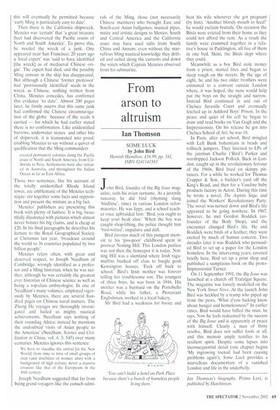From arson to altruism
Ian Thomson
SOME LUCK by John Bird Hamish Hamilton, £16.99, pp. 341. ISBN 0241141583 John Bird, founder of the Big Issue magazine, suits his avian surname. As a juvenile runaway he did bird (rhyming slang 'birdlime', time) in various London reformatories, He was lippy, and a school teacher once upbraided him: 'Bird, you ought to keep your beak shut.' When the boy was caught shop-lifting, the police thought him 'bird-witted', impulsive and daft.
Bird devotes much of this pungent memoir to his 'piss-poor' childhood spent in postwar Notting Hill. This London purlieu was not then the honeypot it is today. Notting Hill was a slumland where Irish ragamuffins bunked off class to burgle posh Kensington houses. `Feck off back to school,' Bird's Irish mother was forever telling her troublesome son. The youngest of three boys, he was born in 1946. His mother was a barmaid on the Portobello Road, while his father, a Protestant Englishman, worked in a local bakery.
Mr Bird had a weakness for booze and beat his wife whenever she got pregnant (by him). 'Another bloody mouth to feed!' he would exclaim brutally. On occasion the Birds were evicted from their home as they could not afford the rent. As a result the family were crammed together in a relative's house in Paddington, all five of them in one bed. Skint, the Birds slept where they could.
Meanwhile as a boy Bird stole money from a priest, started fires and began to sleep rough on the streets. By the age of eight, he and his two older brothers were entrusted to a convent outside London where, it was hoped, the nuns would help put the boys on the straight and narrow. Instead Bird continued in and out of Chelsea Juvenile Court and eventually fetched up in Ashford Boys' Prison. In the peace and quiet of his cell he began to draw and read books on Van Gogh and the Impressionists. On his release he got into Chelsea School of Art; he was 18.
In Paris, after art school, Bird mingled with Left Bank bohemians in beads and rollneck jumpers. They listened to LPs of the jazzman Charlie (`Bird') Parker and worshipped Jackson Pollock, Back in London, caught up in the revolutionary fervour of the 1960s, Bird lived on skimpy pittances. For a while he worked for Thomas Crapper & Son, a builder's yard off the King's Road, and then for a Vaseline baby products factory in Acton. During this time he wrote a novel, The Aspirin Saga, and joined the Workers' Revolutionary Party. The novel was turned down and Bird's life appeared to be going nowhere. In 1967, however, he met Gordon Roddick (cofounder of the Body Shop), and the encounter changed Bird's life. He and Roddick were birds of a feather; they were excited by much of human concern. Two decades later it was Roddick who persuaded Bird to set up a paper for the London homeless. In the intervening years, covered briefly here, Bird set up a print shop and published a sumptuous book on the protoImpressionist Turner.
On 11 September 1991, the Big Issue was launched at a church off Trafalgar Square. The magazine was loosely modelled on the New York Street News. At the launch John Bird was heckled by a tramp who piped up from the pews, 'What d'you fucking know about hunger and homelessness?' In earlier times, Bird would have biffed the man, he says. Now he feels redeemed by the success of the Big Issue and is apparently at peace with himself. Clearly a man of flinty resolve. Bird does not suffer fools at all, and this memoir amply testifies to his resilient spirit. Despite some lapses into inconsequential detail (one chapter begins 'My ingrowing toenail had been causing problems again'), Some Luck provides a marvellous documentary of a vanished London and life in the underbelly.
Ian Thomson's biography, Primo Levi, is published by Hutchinson.


































































































 Previous page
Previous page